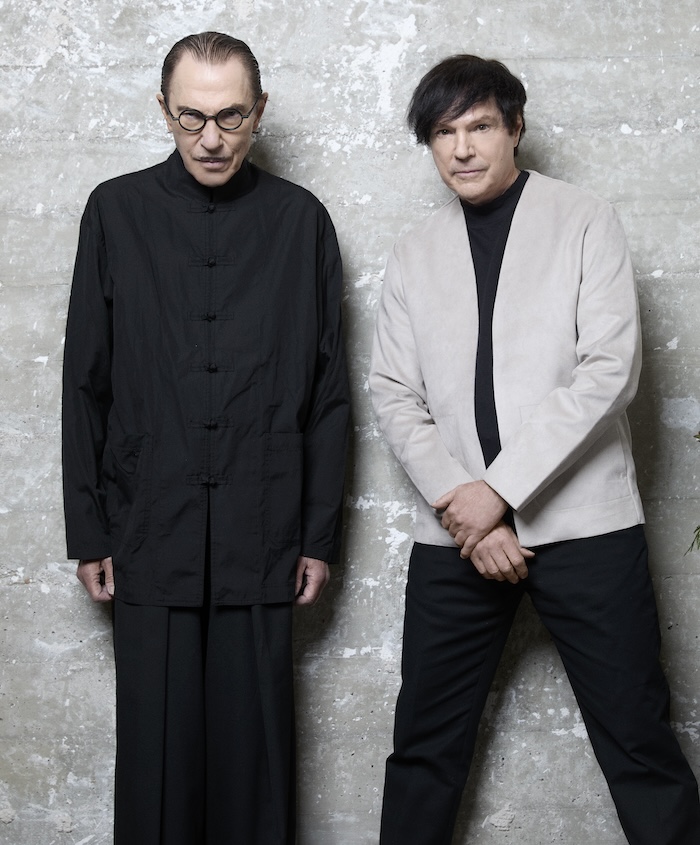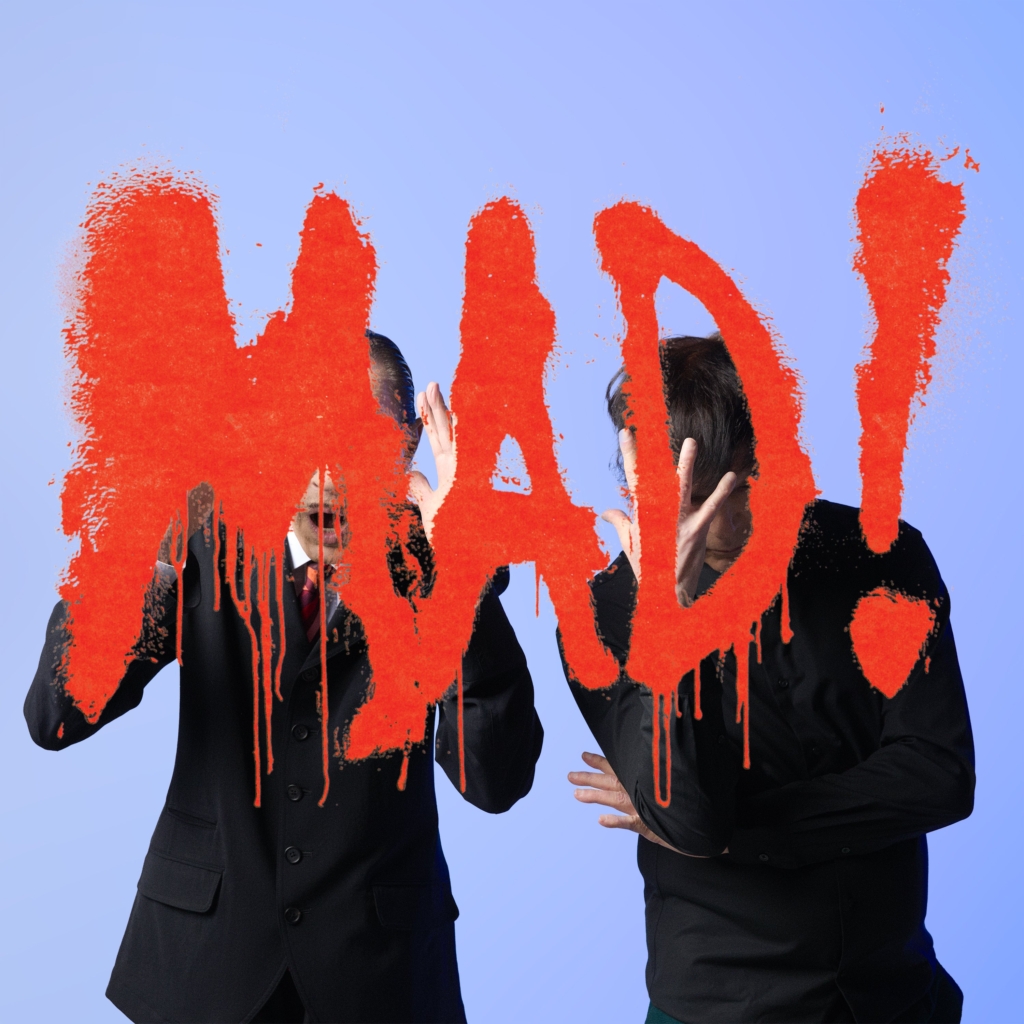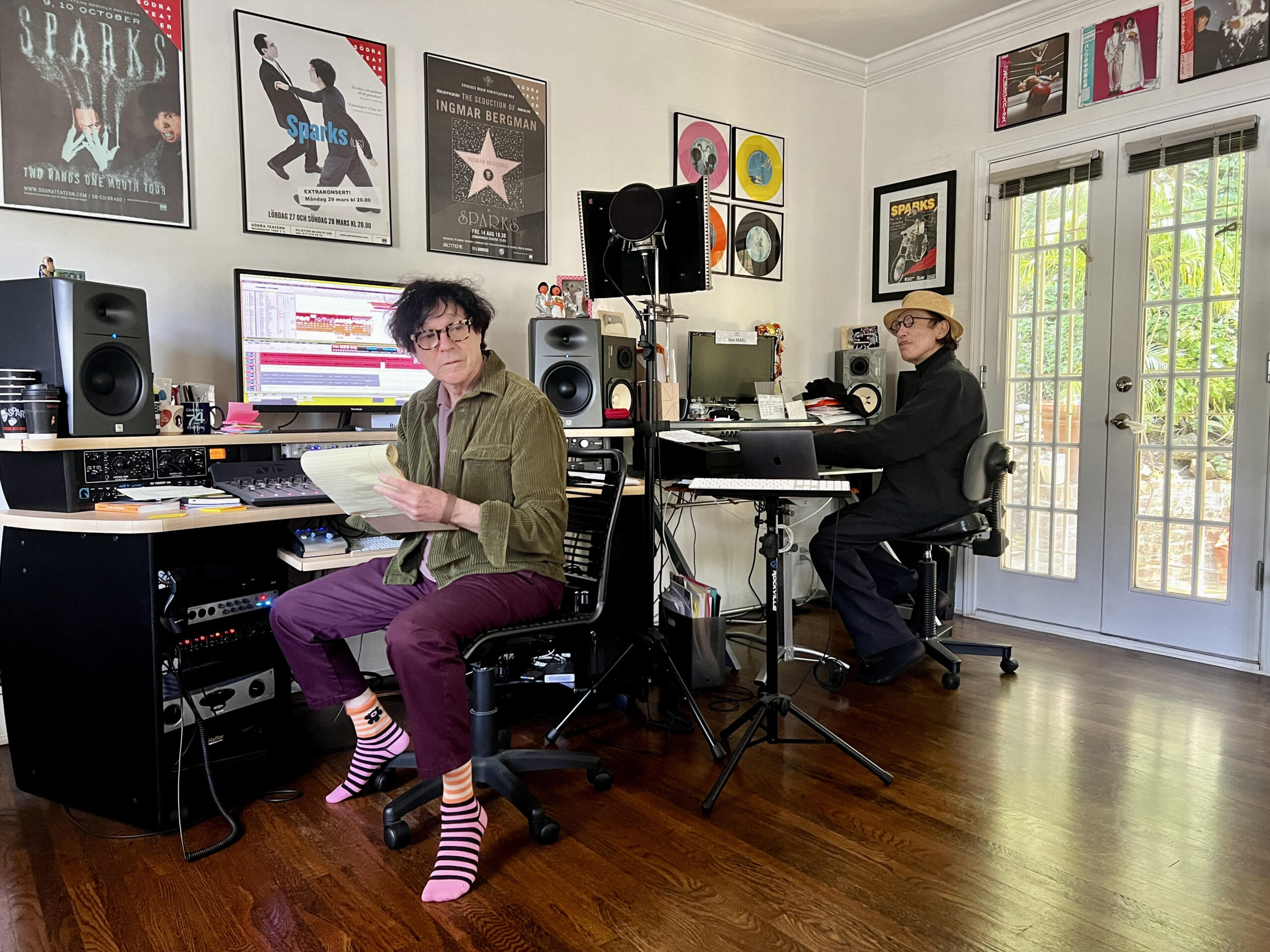New York, NY (July 7, 2025)—Sit down with Sparks for a few minutes and it becomes obvious why the two musicians have never split up. Ron and Russell Mael expand on each other’s thoughts. They fact-check each other. They make each other grin. And unlike nearly every other set of brothers in the history of music, they clearly enjoy each other’s company. Together, they’re a creative team that has released 28 albums; the latest—Mad!—entered the U.K. album chart in May at Number 2, marking their highest chart position ever.
If that kind of reception seems unlikely for a band 50-plus years into its career, well, no one’s more surprised than the Maels themselves. “It’s pretty astounding that for these newer fans who came on board, there isn’t a ‘Golden Era of Sparks,’” says Russell. “They’re seeing Sparks as what we’re doing now, and they see it as something that’s really cool and modern. They go back, hear the other albums, and go, ‘Oh, Kimono My House, it’s okay, you know,’ but they don’t even think that it has to be one of the ‘landmark albums’ in our discography; to them, what we’re doing now is what’s important.”
Across that important new album, the Maels draw on everything from art rock to techno to Philip Glass to Abbey Road as they take on influencer culture in “Running Up a Tab at the Hotel for the Fab”; their hometown with the sardonic “I-405 Rules” (“405, you’re a dream / L.A. pride, like Kareem”); and self-determination with the lead-off single “Do Things My Own Way,” declaring “I’m Howard Hughes / In Jordan Twos.” They’ve traveled a long way since their first hit—the falsetto-fueled “This Town Ain’t Big Enough for Both of Us” from 1974’s Kimono My House—but a few things remain constant to this day: Ron writes the songs, Russell sings them, and the quirky melodies and equally askew lyrics have been their trademark from the start.
“When we worked with Todd Rundgren on our first album in 1972, he stressed to us to retain your character and personality in what you do,” says Russell. “Day One, he said, ‘You guys have got this world that you’ve created’ and he didn’t want to tamper with that. He wanted to maybe help sonically enhance it, because at the time we didn’t have the means to record well, but he said, ‘Don’t sand off the rough edges of what you’re doing.’ Something like that isn’t a musical or technical thing, but it is a lesson in recording, we think. A producer’s role isn’t always clearly defined…but sometimes it’s about giving you moral support, to say, ‘Don’t worry about what other people think about it; keep to your vision.’”
It’s a lesson the brothers have carried with them ever since, but it’s not the only one that came to mind when they started producing themselves; they had plenty of insights to draw from, having already worked with Rundgren, Muff Winwood and Tony Visconti. “We learned from the best and then were able to apply a lot of what we learned to doing it on our own,” says Russell. “Tony Visconti is an absolutely amazing producer, musician, technician and a tastemaker—for our taste anyway. The projects he gets involved in range from David Bowie to T. Rex to, well, Sparks, so that’s a good club to be part of.”

Their biggest influence, however, may have been Giorgio Moroder, who helmed 1979’s No. 1 in Heaven. Teamed with the Italian disco producer, the brothers made an abrupt left turn into electronic music and wound up pioneering that 1980s staple—the synthpop duo—as they radically redefined their sound.
Ron recalls, “We were in this studio, Sound Art, in Los Angeles, and it was walls of synthesizers— really early ones with 16 lights you used to highlight what [sound] you wanted the thing to be on. It was before any electronic drums—Keith Forsey was Giorgio’s drummer, stomping the floor four times a measure in perfect time.”
Russell picks up the story, adding, “We were at Giorgio’s house when his LinnDrum was delivered. Giorgio was buddies with Roger Linn—because of course he would be—and he gets the first LinnDrum ever.”
Inside the Recording of Green Day’s ‘Saviors’
The downside to their electronic deep dive was that they were unable to perform those songs in concert due to the technology and audiences of the day. “We couldn’t tour at the time because there was no way to re-create any of it,” says Ron. “We didn’t really re-create the No. 1 in Heaven album live until 1994 because of that. I think things have really changed for the better, also because audiences now accept the fact that they’re not always seeing somebody on stage playing a musical part. Before, it was seen as, ‘Oh, it’s not pure music, because they’re not playing it,’ but it is—it’s a different aesthetic, and I’m all for that.”

The brothers took advantage of the project studio revolution of the 1990s to start producing themselves and assembled the private facility that has become their creative home base. “Russell has a studio at his place, and he’s become incredibly adept at all the basic engineering tricks,” says Ron, adding, “We hesitate to even show it to anybody because, you know, some of our sounds are large and bombastic, and people tend to want to see huge boards in a studio with a person that brings you coffee and all that. We prefer working the way that we’re working, because everything has advanced so much that you can do it in a way that isn’t maybe visually impressive, but it is sonically impressive.”
Are there drawbacks? “There’s probably birds tweeting in the background of most of our recent records,” Ron says with a chuckle, to which Russell adds, “Thursday mornings are rough for recording because of the leaf blowers in the neighborhood—and trash day with the trash trucks—but apart from that, it’s good.”
The evolution of DAWs and modern recording gear also freed the duo to get more experimental, leading to nearly formless songs like “Your Call’s Very Important to Us. Please Hold” from 2002’s Lil’ Beethoven and now “A Long Red Light” from Mad! “We’re able to juggle around the structure of songs more,” says Ron. “When we were recording in huge studios, you could obviously edit things, but now it’s so easy to say, ‘I want this middle eight toward the beginning of the song’ and try it. Now we work a lot in that collage approach, to try to make the song as interesting as possible.”
Russell elaborates, “There are ones that are more experimenting in the studio, and they are fun for that reason—like ‘A Long Red Light.’ We’ve been asked, ‘So is that a metaphor for…’ whatever you want it to be. We said, ‘No, it’s literally about a guy at a long red light being frustrated at sitting at a long red light.’ We like seeing how you can have it evolve over the length of the song while you hone in on this really tiny idea—the song blows it up until it’s almost like a mini opera in a way and it takes on a bigger life, making it interesting by how you sonically have some build to it. By the end of that song, it’s this big choir, and orchestration comes in, and they’re really, ‘It’s certainly been a long red light!’ We like working in that way—going in without a formulated song other than that idea of ‘a long red light’ and no parameters, so you see what you can come up with.”

That creative freedom doesn’t go unchecked, however; if anything, the Maels find their tracks require more brutal assessment at every step now. “Despite the changes in the way things are recorded, the song is still the most essential thing that you’re working with,” says Ron. “We have a pretty broad definition of what a song is, but the songs mattered to Todd Rundgren, they mattered to Muff Winwood when we were with Island Records, and they mattered obviously to Giorgio Moroder and Tony Visconti. With all those producers, despite the fact that they were so expert at actual recording, the song was what mattered the most to them. One thing that we’ve had to adopt is this merciless choosing of what has quality, as far as even starting to work on something and whether it is worth continuing on or not. That’s part of a producer’s job, and sometimes you resent a producer saying something isn’t up to your level, but we’ve had to adopt that philosophy, stepping outside of the ‘I love this because I did it’ phase.”
Discover more great stories—get a free Mix SmartBrief subscription!
Certainly other people love what they’ve done; in recent times, director Edgar Wright profiled the band with an epic documentary, The Sparks Brothers, where everyone from Jack Antonoff to Weird Al Yankovic sang their praises, and the duo also collaborated with director Leos Carax to write the screenplay and music of the 2021 film Annette. Now the duo have another movie musical, X-Crucior, heading toward production with revered Hong Kong action director John Woo at the helm.
To have a hit album, a musical in the works and a world tour underway is exciting for the Maels, but also the result of incessant hard work—and they wouldn’t have it any other way. “It’s kind of surreal to be in the position that we’re in now, so we’re trying to push that surrealistic element to its ultimate,” says Ron. “Some young people hear the album, they don’t know anything about the band and they think it’s somebody new; to us, that’s pretty astounding, but it’s also really inspiring for us to know that…. It isn’t trying to ‘write for the youth market’ or anything like that; we don’t feel frustrated musically by doing what we’re doing now. Other than working in film, we don’t see this as a stepping stone to what we really want to do—this is what we want to do!”
